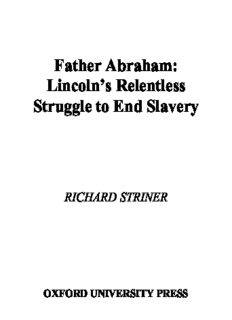
Father Abraham: Lincoln's Relentless Struggle to End Slavery PDF
Preview Father Abraham: Lincoln's Relentless Struggle to End Slavery
LINCOLN AND THE BEST CASE FUTURE (cid:1) (cid:1)(cid:2)(cid:3)(cid:4)(cid:5)(cid:6)(cid:7)(cid:2)(cid:8)(cid:6)(cid:2)(cid:4)(cid:2)(cid:9) ALSO BY RICHARD STRINER Washington Past and Present: A Guide to Our Nation’s Capital (with Donald R. Kennon) Art Deco The Civic Deal: Re-Empowering Our Great Republic (cid:1)(cid:2)(cid:3)(cid:4)(cid:5)(cid:6)(cid:7)(cid:2)(cid:8)(cid:6)(cid:2)(cid:4)(cid:2)(cid:9) L ’ R S INCOLN S ELENTLESS TRUGGLE TO E S ND LAVERY R S ICHARD TRINER 2006 Oxford University Press, Inc., publishes works that further Oxford University’s objective of excellence in research, scholarship, and education. Oxford New York Auckland Cape Town Dar es Salaam Hong Kong Karachi Kuala Lumpur Madrid Melbourne Mexico City Nairobi New Delhi Shanghai Taipei Toronto With offices in Argentina Austria Brazil Chile Czech Republic France Greece Guatemala Hungary Italy Japan Poland Portugal Singapore Copyright © 2006 by Richard Striner Published by Oxford University Press, Inc. 198 Madison Avenue, New York, NY 10016 www.oup.com Oxford is a registered trademark of Oxford University Press All rights reserved. No part of this publication may be reproduced, stored in a retrieval system, or transmitted, in any form or by any means, electronic, mechanical, photocopying, recording, or otherwise, without the prior permission of Oxford University Press. Library of Congress Cataloging-in-Publication Data Striner, Richard, 1950– Father Abraham : Lincoln’s relentless struggle to end slavery / Richard Striner. p. cm. Includes bibliographical references and index. ISBN-13: 978-0-19-518306-1 ISBN-10: 0-19-518306-1 1. Lincoln, Abraham, 1809–1865—Views on slavery. 2. Lincoln, Abraham, 1809–1865—Relations with African Americans. 3. Slaves—Emancipation—United States. I. Title. E457.2.S89 2006 973.7’092—dc22 2005023083 1 3 5 7 9 8 6 4 2 Printed in the United States of America on acid-free paper To my wife, Sara Jane, and all my family This page intentionally left blank (cid:1)(cid:2)(cid:3)(cid:4)(cid:5)(cid:3)(cid:4)(cid:6) Acknowledgments ix Introduction 1 (cid:1)(cid:2)(cid:3) Lincoln and Slavery: The Problem 5 (cid:4)(cid:5)(cid:6) Lincoln and Free Soil, 1854–1858 35 (cid:4)(cid:7)(cid:8)(cid:3)(cid:3) Lincoln and Slavery: Containment, 1859–1861 89 (cid:9)(cid:6)(cid:10)(cid:8) Lincoln and Emancipation, 1861–1862 137 (cid:9)(cid:11)(cid:12)(cid:3) Lincoln and the War to the Death, 1863 189 (cid:13)(cid:11)(cid:14) Lincoln and the Worst-Case Future, 1864 217 (cid:13)(cid:3)(cid:12)(cid:3)(cid:2) Lincoln and the Best-Case Future, 1864–1865 241 Notes 265 Select Bibliography 293 Index 297 This page intentionally left blank (cid:7)(cid:8)(cid:9)(cid:3)(cid:2)(cid:10)(cid:11)(cid:5)(cid:12)(cid:13)(cid:14)(cid:5)(cid:3)(cid:4)(cid:6) (cid:1) WISH TO THANK the following people for their contributions to the book. I am deeply grateful to James M. McPherson, Eric Foner, David Grimsted, Harold Holzer, Michael Burlingame, Herman Belz, Robert Cleary, and my wife, Sara Striner, for their willing- ness to review the manuscript in whole or in part. I am especially in- debted to my literary agent, John W. Wright, for his many helpful suggestions. At Oxford University Press, I will always be grateful to my editor, Peter Ginna, his assistant, Laura Stickney, and senior pro- duction editor Joellyn Ausanka for their many outstanding contribu- tions to this book. I will always remember the encouragement provided by my family (especially my parents) and my friends Richard Berryman, Avis Black, Joan Nicolaysen, Jann Hoag, Laura Lieberman, Henry McKinney, and Carl Reddel. I will always be grateful to my graduate student Kevin Fields for his research assistance. Any errors in the book are my own.
Description: